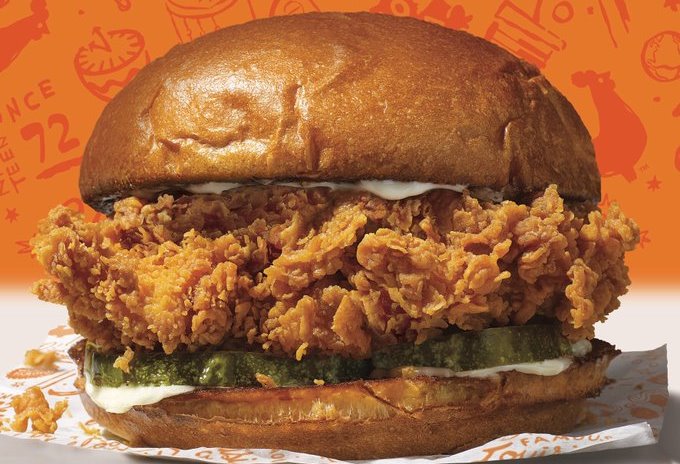
Image source: source: Popeyes via Twitter
The recent so-called Chicken Sandwich Wars on social media offer some worthwhile lessons for PR and marketing pros to chew on and digest.
The social media conflict began after Popeyes, noticing the growing popularity of chicken sandwiches, introduced its own chicken sandwich last month. In a marketing environment dominated by influencers and sponsored content, customers comments played a leading role in its initial Twitter promotions. Some customer comments made comparisons to Chick-fil-A, well-known for chicken meals.
Chick-fil-A, normally subdued on social media, issued a somewhat cryptic and thinly veiled critique of Popeyes’ new product with the tweet: “Bun + Chicken + Pickles = all the ❤️for the original.”
An Earned Media Feast
Popeyes quoted the tweet and shared it, adding “y’all good?” That kicked off the chicken sandwich battle. Popeyes and other fast food restaurants, including Wendy’s, Church’s Chicken and Shake Shack, argued over who makes the tastiest sandwich. Boston Market, which doesn’t even sell a chicken sandwich, joined the discussion. Customers offered their opinions, and memes abounded. Media outlets covered the fast-food food fight and felt compelled to review the sandwich that started the controversy. CNBC’s financial program “Fast Money” even held an on-air, live “taste off” of fast-food chicken sandwiches.
… y’all good? https://t.co/lPaTFXfnyP
— Popeyes Chicken (@PopeyesChicken) August 19, 2019
Apex Marketing Group estimated that Popeyes reaped $65 million in equivalent media value from the Sandwich Wars, Forbes reported. And that was just within the 15 days after the product’s launch.
The attention helped prompt a rush on the sandwiches and doubled store traffic. Popeyes employees worked overtime as they scrambled to churn out the meals. A few overwhelmed workers quit on the spot. Demand far out stripped both the company’s expectations and supply. The chain ran out of the sandwiches in just a couple of weeks.
PR & Marketing Lessons
PR and marketing professionals can learn these lessons from the chicken sandwich social media skirmish.
Visual storytelling. The Popeyes campaign focused on images and videos of its product throughout the campaign. In a creative ploy, Popeyes introduced the product at a Long Beach, CA, restaurant that was caught reselling its sandwiches two years ago. This time, Popeyes invited the pub to be the first to sell its chicken sandwiches and announce the mutual beneficial arrangement in a YouTube video.
“PR pros should remember that even the most exciting announcements can be enhanced and improved with compelling visuals and multimedia components,” writes Lisa Arledge Powell, president of communications agency MediaSource, for the PRSA. “Rather than cookie-cutter intro videos, take a chance on telling a story with your video.”
Cheerfulness beats solemnity. When it ran out of the sandwiches, Popeyes found opportunity in the situation. Its upbeat video announcement highlighted the products popularity, promised its return, and urged customers to get its app to know when it returns to stores. Corporate mishaps often prompt stoic statements of serious apologies, but lighthearted engagement and optimism often offer a better option, Powell says.
Don’t be chicken. Popeyes maintained a light-hearted, rather than argumentative, tone to create a likeable brand image, but it wasn’t afraid to talk back to rivals. Conversely, KFC was silent during the social media clash. Very odd for a brand based on chicken.
“Seriously, KFC, your mascot is literally a colonel. There’s no time for poultry pacifism in a world of social scorched earth,” commented Adweek editor David Griner, who rated the brand last in the race.
Competitor comparisons. Popeyes benefited from comparisons to Chick-fil-A, a category leader. The competitor’s polarizing reputation helped, as customers took advantage of the situation to knock the brand.
“Popeyes was able to attract so many customers largely through social media and word of mouth because not only did they launch a new product that customers legitimately loved, they got a ‘dialogue’ started about the chicken sandwiches themselves that rapidly snowballed into a larger conversation about values and beliefs when they took a direct shot at Chick-Fil-A,” Deb Gabor, the CEO of the brand-strategy consultancy Sol Marketing, told Business Insider.
Seek succinct wordsmiths. With just 280 characters allowed in tweets, every word — and syllable — counts. To stand out, consider seeking creative social media marketers with backgrounds in poetry, hip-hop or creative writing, writes Sophie Maerowitz for The Social Shake-Up.
Create a good product. While PR and marketing efforts attracted attention, commenters said the Popeyes chicken sandwich really was tasty.
Bottom Line: The Popeyes chicken sandwich campaign may rank as one of the best PR and marketing campaigns of the year. PR and marketing practitioners can learn several lessons from the Popeyes campaign as well as competitors’ responses. In the end, the campaign probably elevated sales of all fast-food chicken sandwiches.
William J. Comcowich founded and served as CEO of CyberAlert LLC, the predecessor of Glean.info. He is currently serving as Interim CEO and member of the Board of Directors. Glean.info provides customized media monitoring, media measurement and analytics solutions across all types of traditional and social media.




